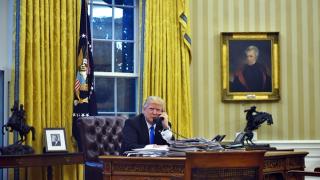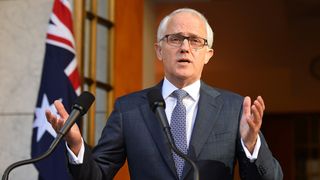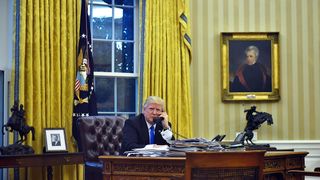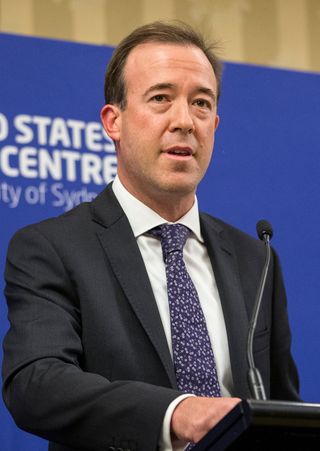It has been some time since there has been this kind of anticipation leading into an official meeting between an Australian prime minister and an American president.
But in some respects, Prime Minister Malcolm Turnbull is at a disadvantage when compared with his predecessors. US President Donald Trump is a unique figure and past encounters between US and Australian leaders provide less than the usual guidance about how best to approach the meeting.
Nevertheless, there are some lessons to be learnt.

First, that the bumpy start to the relationship between Turnbull and Trump is nothing new.
Australian prime ministers have often had to brace for a chilled reception in America. Menzies, Gorton, McMahon, and Whitlam all arrived at the White House having either set out policy positions clearly at odds with the United States, or having had open disagreements with US presidents. Since the signing of the ANZUS treaty in 1951, very few Australian leaders have arrived in the US without policy differences to address.
Second, some Australian prime ministers have agonised over their ability to strike a strong personal relationship with US presidents.
The intimacy of the bond between Harold Holt and Lyndon Johnson proved elusive for John Gorton, and Gough Whitlam openly sought to depersonalise the alliance during his own controversial visit in 1973.
While a personal bond can be extremely useful, especially given the premium that the current US president seems to place on it, the lack of such a connection has never been fatal to the broader relationship overall, even if it means working harder in other parts of the alliance.
The third lesson is that there is nothing new in leaders of the US and Australia adopting contrasting positions and policies on how to approach challenges in Asia.
American leaders and officials have often been shocked to find that Australia has held a different perspective on Asian affairs. None of this, however, need imperil the development of a close and effective working relationship.
Turnbull's priority should be to get a better grasp of Trump's thinking on China and America's Asian stance more broadly. He may also have to carry something in his back pocket to offer Trump as a quid pro quo for the US President honouring the refugee resettlement deal. And that's most likely to be some kind of increase in Australia's military commitment to the Middle East.
The meeting aboard the USS Intrepid, an old Essex-class aircraft carrier built during the Second World War and now moored in New York Harbour, does look to have been hastily arranged, hurriedly tacked on to a commemorative event marking the 75th anniversary of the Battle of the Coral Sea.

It is, of course, only proper that allies remember past struggles and sacrifice, especially one where US and Australian forces turned the tide of the Pacific War by stemming the advance of Japanese imperialism. The Australia-US defence relationship, past and present, will no doubt be to the fore in New York, and the mellifluous rhetoric of "brothers in arms" will flow. Probably no other venue in the US could better capture the way in which the history of the relationship is so deeply rooted in the experience of war and conflict.
But there can be little doubt that Canberra would ideally have preferred a meeting in the Oval Office or at Mar-a-Lago.
Instead, Trump and Turnbull will meet on a floating museum. It is a step down in protocol terms for an Australian leader, even if the photos from this encounter bury those angry, January images of an enraged Trump fuming down the phone line to Canberra.
Trump, though, is likely to be at ease – in New York and aboard an aircraft carrier.
In office, the US President has surrounded himself with military generals and has talked openly of rebuilding American naval muscle. In Washington, meanwhile, tumbleweed rolls fitfully down lonely State Department corridors, where the vast majority of senior diplomatic appointments are still to be made. Being aboard the Intrepid might remind Trump of what allies can achieve together when a grave threat emerges: but it's more likely to entrench his view that in the past, America has done its fair share for its friends; and that those friends now need to step up and do more.
The primary risk for this meeting, though, is that it will be literally awash with cosy rhetoric and reverie, putting on display an alliance that appears to be cruising in its own sea of complacency and nostalgia.
Yet nearly 50 years ago, Americans diplomats realised that old cliches about the alliance needed replacement. "We have been old allies," said a State Department assessment in 1969, but "rhetoric and sentimentality must give way to mutual accommodation". The "Coral Sea Generation", they judged, was "being replaced by a new generation in Australia that is critical, discerning and increasingly nationalistic".
Neither Turnbull nor his foreign minister show any signs of bringing a more critical or discerning eye to relations with the US. Instead, they talk of an America where nothing has changed since last November.
A little too much faith, it seems, is being put into anchoring this relationship in memory. What's not clear, though, is whether Trump is an American president susceptible to the allure of old alliance ritual.






